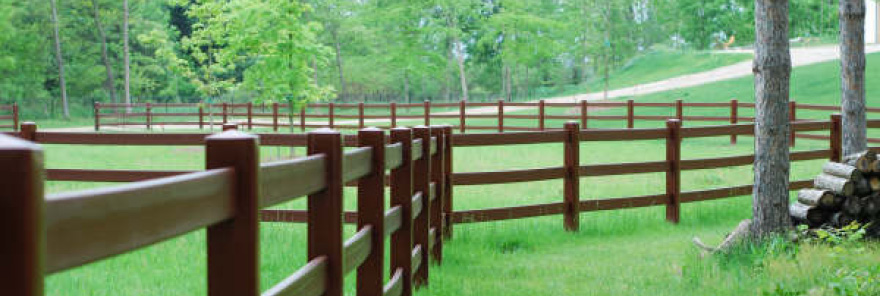A key element of any horseperson’s day: putting a horse someplace, and keeping them there.
Whether it’s a stall, a paddock, a round pen, or a pasture — since humans started working with horses, we’ve been building fences to keep them where we want them.
Traditionally, wooden rails have done that job for us. Wooden barns, wooden fencing — trees have been converted into corrals for much of horse-human history. Lately, faced with a world in which keeping trees standing is more important than chopping them down, horsemen have been turning to alternative methods of keeping track of our horses. Bamboo has become an excellent alternative to wood in our stables, as a sustainable weed with the same good looks and durability as hardwoods.
And just as horsemen are finding to alternative, sustainable materials for the stable, there are alternatives to wooden fencing on offer with new benefits that might rival tradition. Non-toxic, recyclable, durable, and beautiful — these materials coming onto the market offer horsemen an alternative to make a green choice for their horses.
High-density polyethylene (HDPE) is one such material, as shown in this project https://equinefacilitydesign.com/project-item/boyd-stable
Although it doesn’t sound as green and natural as bamboo, this petroleum-derived material offers one key earth-friendly benefit: it’s one hundred percent recyclable. And you’ve probably already used HDPE in your home at least once today: it’s commonly used to make milk jugs.
More flexible than other plastics, and more durable than vinyl, HDPE fencing is resistant to shattering, cold weather, stains, and acids from manure and urine. And unlike pressure-treated wood, HDPE does not contain contaminants such as chlorine or arsenic. While pressure-treated lumber needs to be regularly coated with stains or creosote to prevent arsenic exposure, HDPE fencing requires neither painting nor protective coatings.
Although it’s a synthetic material, HDPE seems like a natural choice for a farm where keeping a pure environment — from a clean water table to a chew-resistant fencing for mouthy foals — is key to animal health. And it’s long-lasting. Some manufacturers, such as the Derby Fence Company, http://www.derbyfence.com/, offer a 20 year limited warranty.
That’s just as long, or longer, than the expected life of pressure-treated wood fencing. And unlike pressure-treated wood, which should be disposed of in a landfill, HDPE fencing can be recycled at the end of its usefulness — maybe into new fencing!


